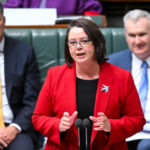France, Japan, China, Russia, New Zealand, and Singapore were among the nations that supported a push for Palestine’s membership in the United Nations. Australia also voted in favor of a U.N. resolution advocating for Palestine to be granted full U.N. membership. This decision caused Australia to diverge from allies such as the United States and Israel, who opposed the motion. The resolution emphasized that Palestine is fully qualified for U.N. membership but does not grant immediate membership, as it requires the support of the U.N. Security Council.
Australia’s vote was different from countries that abstained, including the United Kingdom, Canada, and others. The resolution received support from 143 nations, including New Zealand, China, Russia, Korea, France, Japan, and others. The motion expressed regret over the U.S. vetoing Palestine’s bid for U.N. membership and emphasized the importance of direct negotiations between Israel and the Palestinian authority for achieving statehood.
Foreign Minister Penny Wong defended Australia’s decision, highlighting the resolution’s role in contributing to a two-state solution. However, Shadow Foreign Minister Simon Birmingham criticized Labor’s support for the resolution, stating that it prioritizes violence and terrorism over negotiation and diplomacy. The resolution holds significance as it provides Palestine with certain rights and privileges at the U.N. General Assembly.
The resolution also reaffirms support for lasting peace in the Middle East and a two-state solution for Israel and Palestine. It expresses deep regret over the U.S. veto at the U.N. Security Council that prevented Palestine from being recommended for U.N. membership. Shadow Foreign Minister Birmingham emphasized the importance of the pathway to a two-state solution and raised concerns about the resolution’s potential impact on long-term peace efforts.
Former Prime Minister Tony Abbott expressed dismay over Australia’s decision to support the U.N. motion without first addressing concerns related to terrorism and Israel’s security. Amid Australia’s support for the U.N. motion, Foreign Minister Wong emphasized the need for a future governance plan in Gaza that excludes Hamas.
Ms. Wong reiterated Australia’s long-standing belief that a two-state solution remains the best chance for achieving lasting peace in the Middle East.
She emphasized that Hamas should not have a role in the future governance of Gaza, but instead emphasized the importance of the Palestinian Authority.
“We support the idea of a Palestinian Authority that has implemented necessary reforms to assume its responsibilities over a unified West Bank and Gaza,” stated Ms. Wong.
“Our goal is to see a Palestinian governing authority that is dedicated to peace, rejects violence, and is prepared to participate in a meaningful political process.”






